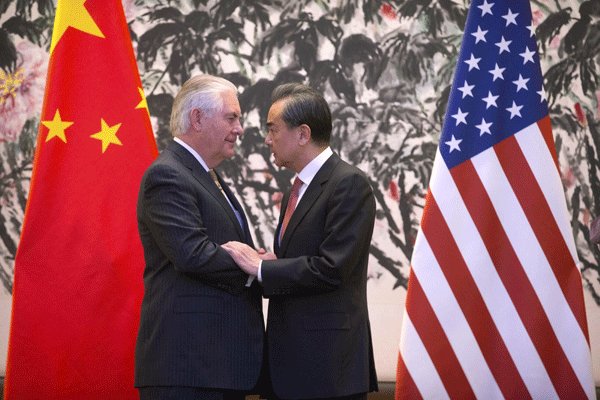Talks between the top diplomats of the United States and China on Saturday underscored a marked difference in their approaches toward North Korea, despite their shared concerns and promise of cooperation regarding its ever-growing threats.
US Secretary of State Rex Tillerson met Foreign Minister Wang Yi during his visit to Beijing, the last leg of his three-nation trip to Asia following stops in Japan and South Korea.
Their talks focused on the upcoming summit between their leaders and the North’s escalating nuclear and missile threats.
 |
US Secretary of State Rex Tillerson met Foreign Minister Wang Yi (AFP-Yonhap) |
In a joint press conference after the meeting, Tillerson said that the North’s threats have reached a "dangerous level" and that the two sides agreed to cooperate to make the North choose a better path. He promised to work together with China on resolving the North’s nuclear ambitions.
But a stark difference in their future approaches was apparent when Wang reiterated the importance of diplomacy in breaking the nuclear stalemate.
Tillerson’s seemingly moderate and cooperative tone came only after he had unleashed a barrage of hawkish remarks against North Korea during his stops in Tokyo and Seoul.
In a press conference in Seoul, Tillerson declared the end of former US President Barack Obama’s "strategic patience" policy and signaled a sharp turn toward a tougher policy involving ramped-up sanctions, pressure and even military actions.
"The policy of strategic patience has ended," he said. "We are exploring a new range of diplomatic, security and economic measures. All options are on the table."
Tillerson said that military measures could be one option if the threat from the North gets too high.
He also ruled out the possibility of any immediate negotiations. He noted that conditions are "not ripe" for any talks with the North, while calling on China to do more to induce a meaningful change in its behavior.
In Tokyo, he emphasized the need for a "new approach" after the failure of the past two decades of talks and aid to the North on hopes that it will take the path to denuclearization.
He didn’t provide details but provided a glimpse into what appears to be the Trump administration’s new policy toward the recalcitrant North, experts said.
Wang, meanwhile, hinted that China doesn’t see eye-to-eye with the US on how to deal with the North. He said that diplomacy should be pursued and called for the resumption of the long-suspended six-party denuclearization talks.
Last week, Wang said sanctions are just one option but no less important is to encourage talks. He said China will play its part in bringing the nuclear stalemate back to the "negotiation" track.
The close ally to the North played host to the six-party negotiations involving South and North Korea, the United States, China, Japan and Russia until they came to a stop in late 2008.
China’s repeated emphasis on diplomacy and negotiations are in contrast with the US’s approach which rules out any talks until the North takes a meaningful step toward denuclearization.
Experts expect the differing approaches between the two superpowers to continue for the time being despite their pronounced common awareness of the North’s military threats.
"It seems to be hard to find common ground between the US and China. The Trump administration is getting tougher on the North, while China mentions the resumption of the six-party talks. This signals parallel approaches between the two for the time being," said Kim Yong-hyun, a professor of North Korean studies at Dongguk University.
"From China’s standpoint, once it gives into the so-called new approach proposed by the US, it could end up hurting its ties with the North. It might be hard for Beijing to strongly rebuff the strong US push, but chances are high that it will still stay put on its own stance for some time," he added.
Tillerson’s first trip to Asia as secretary of state comes amid concerns that North Korea might be preparing additional provocations including a possible nuclear test.
Pyongyang conducted two nuclear tests last year alone and continued to ignore multiple international resolutions and sanctions, most recently launching four ballistic missiles on March 6.
Tillerson’s tour is apparently intended to share views with the Northeast Asian stakeholders before the Trump administration comes up with its new North Korea approach, which is said to be in its final stages of review.
Top US nuclear envoy Joseph Yun is currently in Beijing and he will visit South Korea next week to discuss a coordinated approach to the North, indicating that the review of Washington’s policy on the North is nearing an end. (Yonhap)








